- Home
- Edith Wharton
The New York Stories of Edith Wharton
The New York Stories of Edith Wharton Read online
EDITH WHARTON (1862–1937) was born in New York City. Her father, George Jones, was a relative of the Joneses that fashionable people proverbially strive to keep up with; her mother, Lucretia Rhinelander, came from one of the city’s oldest families. Raised in New York and in Europe, Edith Jones was twenty-three when she married Edward Robbins Wharton (known as Teddy). In 1902 they built themselves a forty-two-room house, The Mount, in Lenox, Massachusetts, but Teddy’s mental instability and financial irregularities led to a divorce in 1913, after which Edith moved to France, where she lived for the rest of her life. During the First World War, Wharton threw herself into war relief, traveling to the front lines and founding a charity for refugees, in recognition of which she was made a Chevalier of the Legion of Honor in 1916. Wharton published her first book, a collection of poems, in her teens and in 1897 achieved popular success as co-author of The Decoration of Houses, a treatise on aesthetics and interior design. Her first volume of short stories, The Greater Inclination, came out in 1899. Among the most famous of her many novels are The House of Mirth (1905), Ethan Frome (1912), The Custom of the Country (1913), and The Age of Innocence (1920), for which she received the Pulitzer Prize in 1921, the first woman to do so.
ROXANA ROBINSON is the author of a biography of Georgia O’Keeffe and of six books of fiction, including the novel Sweetwater and the story collection A Perfect Stranger. She is a Guggenheim Fellow and lives in New York City.
THE NEW YORK STORIES
OF EDITH WHARTON
EDITH WHARTON
Selected and with an introduction by
ROXANA ROBINSON
NEW YORK REVIEW BOOKS
New York
CONTENTS
Cover
Biographical Notes
Title Page
Introduction
THE NEW YORK STORIES OF EDITH WHARTON
Mrs. Manstey’s View
That Good May Come
The Portrait
A Cup of Cold Water
A Journey
The Rembrandt
The Other Two
The Quicksand
The Dilettante
The Reckoning
Expiation
The Pot-Boiler
His Father’s Son
Full Circle
Autres Temps...
The Long Run
After Holbein
Diagnosis
Pomegranate Seed
Roman Fever
Copyright and More Information
INTRODUCTION
THE WORLD into which Edith Wharton was born was a dignified one, carefully structured, with a formal façade and an elevated entrance. Based on a solid foundation of Puritan values, it was framed by inherited wealth and insulated by the belief that everything of worth was contained within. The unsettling winds of ambition, need, and change rarely penetrated the thick walls of tradition, pride, and entitlement. The interiors were polished, gleaming, and perfectly composed. The windows were shrouded with drapery, the floors were laid with a heavy carpet of decorum. This was a place of silence, order, and restraint.
A writer’s world both shelters and confines, and she must write her way both into and out of it. She must form her own world, but it will always be part of the one that formed her. It will always be both beginning and end of her journey.
Edith Newbold Jones was born in 1862, in the family brownstone on West 23rd Street. Her forebears were Dutch, English, and Huguenot—a long line of successful merchants, bankers, and lawyers. At the time of Edith’s birth, her family had lived in New York for nearly two hundred years.
The Joneses belonged to the small, privileged world of fashionable society. In these circles, family was more important than wealth, and George Frederic Jones was well-off, but not rich. He had an income from inherited real estate, and was mild, bookish, and gentlemanly, an affectionate father and indulgent husband. His wife, Lucretia Stevens Rhinelander Jones, was not rich either, though she was from an old, grand family: she was one of the “poor Rhinelanders.” Intellectually indolent, Lucretia was intensely absorbed by etiquette and appearances. As a mother she was cold and critical, as a wife she was possibly adulterous, and as a person she was mercilessly snobbish. From her father Edith learned a love of books and of France; from her mother she learned rigid self-discipline and sartorial perfectionism. From both parents she learned the rules of decorum.
Old New York was an insular, tribal society, with a rigid caste system and a strict code of behavior. In her memoir, A Backward Glance, published in 1933, Wharton wrote, “One was polite, considerate of others, careful of the accepted formula, because such were the principles of the well-bred...‘bad manners’ were the worst offence.” The code of manners governed all aspects of behavior, including trivial ones, such as the size of a calling card or the length of a widow’s veil. At its core, however, was a stern Puritan ethos of moral rectitude, self-reliance, and stoic disregard of pain. Self-control was essential, and emotional display was utterly prohibited. To grow up in that society was to recognize the enormous social forces implicit in the command, delivered to a distraught person of any age, “Don’t make a scene.”
Edith learned the rules of this formal, restrained world, but she felt the presence of another unacknowledged one that seethed around her like an invisible mist. This was the one of emotions and ideas. Wharton learned the power of this secret, forbidden realm and understood that the laws of decorum were set up to counteract it. The conflict between these worlds—the mannered, mandarin one, and the passionate, uncontrollable one—would provide the central dynamic of her work.
New York, however, was not Wharton’s only point of reference: at an early age she had discovered Europe. The Civil War brought financial reverses to the Joneses, who rented out their American properties and moved to the Continent. There they lived cheaply for several years during Edith’s childhood, returning because of her father’s health when she was in her late teens. Edith developed an enduring affinity for European languages and culture. The great European capitals, with their wide boulevards, open plazas, and graceful architecture, offered captivating alternatives to New York’s low, monotonous brown grid, just as European salons offered more lively and intellectual conversations than New York’s bland dinner-party chatter. Europe became the vivid locus of Wharton’s imagination, the place to which she was always longing to return.
Partly for financial reasons, Edith made her debut early, at the age of seventeen. She was neither rich nor beautiful, however, and she languished in the marriage market. Finally, at twenty-three, she married Edward Robbins Wharton. It was not a brilliant match: Teddy was twelve years her senior and of modest financial and intellectual means. A genial, aimless fellow, his chief interests were travel and sport, and at thirty-five he still lived with his mother. His father was in a mental institution, though doctors assured Lucretia that his condition was not hereditary. In 1885 Edith and Teddy were married.
At first the Whartons lived quietly in Newport and New York, traveling to Europe when they could afford it. When Edith came into an unexpected inheritance, their financial situation eased; later her royalties provided a substantial source of income. The couple built a grand house in Lenox, Massachusetts, and went more frequently to Europe.
Initially the marriage was affectionate, though probably companionate. Strains began to appear, however, due to intellectual disparity and Teddy’s growing health problems, physical and mental. Edith’s own health suffered as well, and in 1898 she spent several months in a rest cure. By 1902 Teddy was showing signs of his father’s illness and, as his condition worsened, the marriage deteriorated. In 1907, Edith had a secret affair wit
h an American journalist, Morton Fullerton. This was passionate, brief, and unhappy: Fullerton was a bisexual philanderer, cold, withholding, and duplicitous. Four years later, Teddy confessed to his own affair, as well as to the illicit appropriation of Edith’s funds, over which he was trustee. Edith had spent twenty-eight years with an increasingly unstable husband, in an increasingly unhappy union. When Teddy humiliated her publicly and damaged her financially, she finally made the decision to end the marriage.
In 1913 Edith moved to France, where she sued for divorce. This choice was driven partly by discretion: unlike America, France did not require evidence of adultery to be made public in the courts. The move was part of a larger change, however: Wharton sold her house in Lenox and abandoned the world in which she had grown up. At the age of fifty-one she began a new life in a society that accepted her as the person she chose to be—an independent woman—instead of the person she was raised to be—a gentleman’s wife. She spent the rest of her life in France, to which she became deeply devoted.
Wharton never gave up her American citizenship, however, and her deepest literary and emotional connections always remained to Old New York. Her first novel, a historical romance called The Valley of Decision, was set in Italy. When it was published in 1902, Henry James had famously advised her: “Use the American subject! Do New York! There it is round you.” But New York was already Wharton’s subject; she had been “doing” it in her stories for more than a decade, and would continue to throughout her career. New York was the center of her life, the place where she had struggled most ardently with conflicting claims of manners and passion, the place where her heart had beat most powerfully, where her soul had seemed most desperately constrained and her happiness most perilously at risk. New York received her most searching scrutiny, sternest criticism, and deepest understanding. It was her greatest subject.
The twenty stories collected here span the period of 1891 to 1934, nearly the entirety of Wharton’s writing life, and represent more than two-thirds of her New York stories. Taken together—and more than any one of the novels—they reflect the evolution of her engagement with the city, and reveal the development of her imagination and her art. Her early stories show the awkwardness of apprenticeship, but from that apprenticeship come the magisterial reckonings of such late masterpieces as “After Holbein” and the peerless “Roman Fever.” In the stories gathered here we find all of Wharton’s great themes: stifled passion and the suffocating soul; the conflict between idealism and pragmatism; the charged erotic constellation of marriage, adultery, divorce, and betrayal.
The collection also reveals Wharton’s swift growth as a writer. “Mrs. Manstey’s View,” of 1891, is the first story here as well as Wharton’s first published one. In this lovely and beguiling work she lays claim to both her physical territory—the city of New York—and her metaphysical one—les choses d’esprit. Boldly, she chooses a protagonist and setting that are remote from her own experience.
Mrs. Manstey is poor, elderly, socially insignificant. She lives in a boardinghouse on “a street where the ash-barrels lingered late on the sidewalk.” Her view is one of “broken barrels, the empty bottles and paths unswept.” She is widowed and solitary, her neighbors are slatternly and philistine, and her environment grim. This New York seems soulless—but a secret landscape thrives within the slovenly urban one. Plants slip through the cracks in the pavement, invading the stone carapace, blooming and flourishing on their own. Untended and unauthorized, this natural world is powerful and alive.
“My powers of enjoyment have always been many-sided,” Wharton wrote of herself, and Mrs. Manstey, too, finds pleasure in her world, despite her bleak surroundings:
She had grown used to their disorder; the broken barrels, the empty bottles and paths unswept no longer annoyed her; hers was the happy faculty of dwelling on the pleasanter side of the prospect before her.
Nature performs its own triumphant annual pageant:
...did not a magnolia open its hard white flowers against the watery blue of April? And was there not...a fence foamed over every May by lilac waves of wistaria?
Mrs. Manstey’s untended backyard view is filled with the glories of resurgent nature, and a church spire at sunset hints at that earthly paradise, Europe: Wharton declares that even a limited perspective can be sublime.
The story reveals Wharton’s observant eye, her graceful style, and her sense of humor:
“Of course I might move,” said Mrs. Manstey aloud, and turning from the window she looked about her room. She might move, of course; so might she be flayed alive; but she was not likely to survive either operation.
Learning that her cherished view is threatened, Mrs. Manstey takes drastic measures. She can’t win—a poor, elderly widow can’t stop the juggernaut of commerce—but even in defeat Mrs. Manstey achieves a moral triumph, one that reflects the young Wharton’s exuberant belief in the power of passion. The story is not only an impressive debut, it’s a manifesto of Wharton’s commitment to beauty and passion. Here she addresses the drama she’ll continue to explore: the struggles of a woman’s life. Wharton’s women, whether born to privilege like herself or to poverty like Mrs. Manstey, will be threatened by the world. They may have scant power to combat the forces that threaten them, but they will be resourceful, determined, and high-spirited. They will astonish us.
“Never talk about money, and think about it as little as possible,” was one of Lucretia Jones’s imperious dictates. In that world it was the rule not to talk about money, but of course the Joneses thought about it like everyone else. Money was always an issue, and Wharton was always conscious of its power.
Neither her relatives nor her husband had jobs, but everyone had to have money. New York society demanded affluence; it disapproved, however, of striving. The bourgeois requirement for wealth, coupled with the Puritan demand for, in Wharton’s words, “scrupulous probity, in business and private affairs,” produced a complex and paradoxical dynamic. She explored this in a series of meditations on personal ethics—issues of morality and idealism, hypocrisy and nobility, greed and pragmatism.
Another early story, “A Cup of Cold Water,” offers a startlingly realistic rendering of Wharton’s own New York. She reveals its beautiful surfaces and grim undercurrents, its seductive appeal and ruthless mechanics.
Woburn is an impecunious young man in love with the rich Miss Talcott. Because they are both from good families they move in the same circles, but because Woburn is poor, Miss Talcott will never marry him. Wharton depicts the situation with fine irony.
To the girls in Miss Talcott’s set, the attentions of a clever man who had to work for his living had the zest of a forbidden pleasure; but to marry such a man would be as unpardonable as to have one’s carriage seen at the door of a cheap dress-maker. Poverty might make a man fascinating; but a settled income was the best evidence of stability of character. If there were anything in heredity, how could a nice girl trust a man whose parents had been careless enough to leave him unprovided for?
Wealth has its own mesmerizing appeal, which Wharton both articulates and derides:
Woburn was conscious that it was to the cheerful materialism of their parents that the girls he admired owed that fine distinction of outline in which their skillfully-rippled hair and skillfully-hung draperies cooperated with the slimness and erectness that came of participating in the most expensive sports, eating the most expensive food and breathing the most expensive air.
Courting Miss Talbot has been expensive, and Woburn has borrowed heavily from his firm, drifting unintentionally into embezzlement. Facing ruin, he plans to flee to Canada. On his last night, before boarding the ship, he goes to a ball. There he stands apart like a revenant, observing the glittering scene:
Was it possible that these were his friends? These mincing women, all paint and dye and whalebone, these apathetic men who looked as much alike as the figures that children cut out of a folded sheet of paper? Was it to live among such puppets th
at he had sold his soul?...
It was a domino-party at which the guests were forbidden to unmask, though they all saw through each other’s disguises.
Woburn, like many of Wharton’s characters, is trapped within a moral cat’s cradle: he yearns for acceptance by a society he does not respect. His ambivalence is that of Wharton, who remained a member of what she called “the young married set,” even as she wrote about its flaws.
“Was not all morality based on a convention? What was the stanchest code of ethics but a trunk with a series of false bottoms? ... There was no getting beyond the relative.” Woburn scorns the hypocrisy of this world, and in trying to rise within it he has only lowered himself. He has now sunk below the level of those he scorns, and has abdicated his moral position. Still he cannot undertake the last act of cowardice and board the ship.
“Again there rose before him the repulsive vision of the dark cabin, with creaking noises overhead, and the cold wash of water against the pier.” The darkness, the solitude, the cold all suggest that this is the voyage to hell. Woburn resists it, descending, as the night wears on, into increasing penury and a state of heightened awareness. He goes to a cheap hotel and takes a room for the remainder of the night. He follows the room clerk upstairs.
At each landing Woburn glanced down the long passage-way lit by a lowered gas-jet, with a double line of boots before the doors, waiting, like yesterday’s deeds, to carry their owners so many miles farther on the morrow’s destined road. On the third landing the man paused, and after examining the number on the key, turned to the left, and slouching past three or four doors, finally unlocked one and preceded Woburn into a room lit only by the upward gleam of the electric globes in the street below.
The man felt in his pockets; then he turned to Woburn. “Got a match?” he asked.

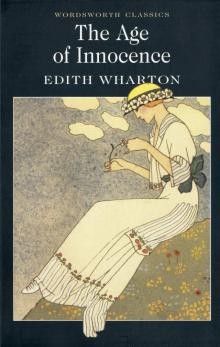 The Age of Innocence
The Age of Innocence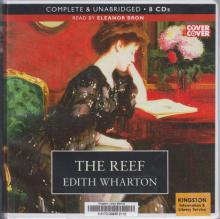 The Reef
The Reef Summer
Summer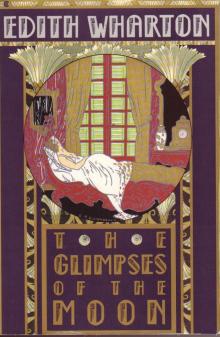 The Glimpses of the Moon
The Glimpses of the Moon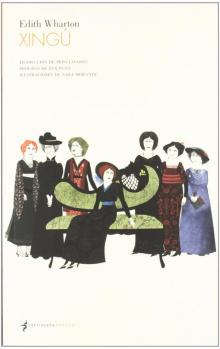 Xingu
Xingu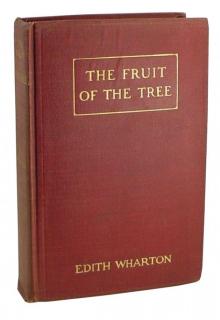 The Fruit of the Tree
The Fruit of the Tree Fast and Loose
Fast and Loose Artemis to Actaeon and Other Verse
Artemis to Actaeon and Other Verse The Line of Least Resistance
The Line of Least Resistance The Lamp of Psyche
The Lamp of Psyche The Reckoning
The Reckoning Afterward
Afterward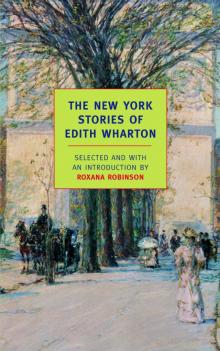 The New York Stories of Edith Wharton
The New York Stories of Edith Wharton The 2014 Halloween Horrors Megapack
The 2014 Halloween Horrors Megapack 'Copy': A Dialogue
'Copy': A Dialogue The Recovery
The Recovery The Fulness of Life
The Fulness of Life Early Short Stories Vol. 1
Early Short Stories Vol. 1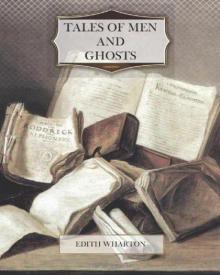 Tales of Men and Ghosts
Tales of Men and Ghosts The House of the Dead Hand
The House of the Dead Hand That Good May Come
That Good May Come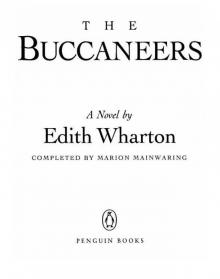 The Buccaneers
The Buccaneers Other Times, Other Manners
Other Times, Other Manners The Hermit and the Wild Woman
The Hermit and the Wild Woman Kerfol
Kerfol The Duchess at Prayer
The Duchess at Prayer Bunner Sisters
Bunner Sisters The Choice
The Choice Madame De Treymes
Madame De Treymes Ethan Frome, Summer, Bunner Sisters
Ethan Frome, Summer, Bunner Sisters In Morocco
In Morocco The Valley of Decision
The Valley of Decision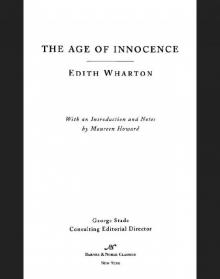 Age of Innocence (Barnes & Noble Classics Series)
Age of Innocence (Barnes & Noble Classics Series) The Angel at the Grave
The Angel at the Grave April Showers
April Showers Sanctuary
Sanctuary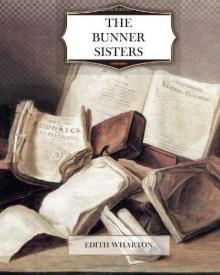 The Bunner Sisters
The Bunner Sisters Mrs. Manstey's View
Mrs. Manstey's View Writing a War Story
Writing a War Story The Custom of the Country
The Custom of the Country In Trust
In Trust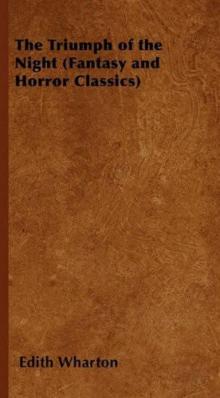 The Triumph of the Night
The Triumph of the Night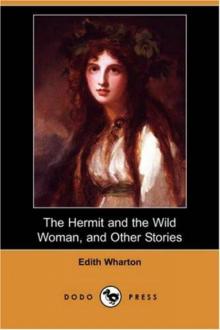 The Hermit and the Wild Woman, and Other Stories
The Hermit and the Wild Woman, and Other Stories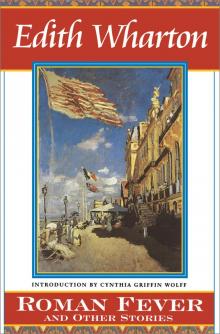 Roman Fever and Other Stories
Roman Fever and Other Stories The Mission of Jane
The Mission of Jane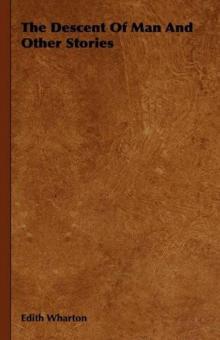 The Descent of Man and Other Stories
The Descent of Man and Other Stories Coming Home
Coming Home The Touchstone
The Touchstone Early Short Stories Vol. 2
Early Short Stories Vol. 2 Edith Wharton's Verse, 1879-1919, from various journals.
Edith Wharton's Verse, 1879-1919, from various journals.